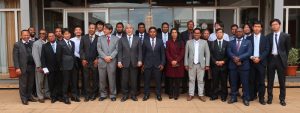On 21 August, Kyoto University established a memorandum of understanding (MoU) with the University of Antananarivo (UoA), Madagascar’s largest national university based in the nation’s capital. The MoU is anticipated to accelerate the pace of academic exchange between the two institutions, wherein multiple department-level exchange agreements were already established as of 2018.
The signing ceremony took place at UoA, where KyotoU was represented by President Juichi Yamagiwa along with several researchers, including Associate Professor Akira Mori of the Graduate School of Science, and Assistant Professor Hiroki Sato of the Center for African Area Studies (CAAS). Representatives from UoA included President Mamy Ravelomanana and several other members of the faculty and staff. Also in attendance was His Excellency Mr Ichiro Ogasawara, ambassador of Japan to Madagascar.
The ceremony opened with greetings from President Ravelomanana, followed by remarks from UoA Faculty of Science Professor Hajanirina Rakotomanana, who had long served as a bridge between the two universities. The professor recounted the details of the process leading up to the agreement, and expressed high expectations for its impact on the Kyoto-UoA academic exchange relationship. The two presidents then signed the MoU document in the presence of Ambassador Ogasawara and others, completing the ceremony.
Afterwards, President Yamagiwa delivered a keynote address, outlining the history of academic exchange between the two universities, and citing some of the successful collaborations that have come out of the partnership. He explained that KyotoU and UoA first collaborated in 1997, and over the next 22 years, have jointly made numerous important discoveries in many fields including ethology, animal ecology, and primatology. The president also noted that the just-concluded agreement can pave the way for collaboration in a range of additional fields, possibly including forest ecology, genetics, anthropology, area studies, and economics. Kyoto University has found another invaluable research partner in Africa.
On the following day, the KyotoU delegation visited a local national park, where some of the University’s researchers are at work. The group inspected the survey activities being carried out in the forest, including primate observation and reptile specimen collection. Participants were impressed by the richness of the Malagasy tropical biodiversity, while at the same time noting signs of rapid decline. By facilitating collaboration in field research and training, the KyotoU-UoA MoU is anticipated to contribute to finding solutions to a wide variety of issues, including biodiversity loss.
 From left: UoA President Ravelomanana, Ambassador Ogasawara, and KyotoU President Yamagiwa |
 President Yamagiwa signing his name on the MoU document |
 Presidents Yamagiwa and Ravelomanana speaking to reporters |
 Observing a captured chameleon |

Signing ceremony attendees


